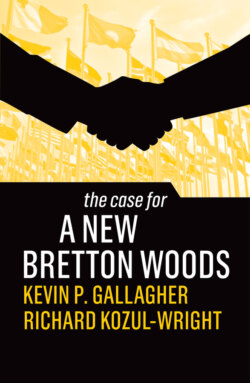Читать книгу The Case for a New Bretton Woods - Kevin P. Gallagher - Страница 6
1 The Fierce Urgency of Now: The Case for a New Bretton Woods Moment
ОглавлениеWe are now faced with the fact that tomorrow is today. We are confronted with the fierce urgency of now. In this unfolding conundrum of life and history, there “is” such a thing as being too late. This is no time for apathy or complacency. This is a time for vigorous and positive action.
Martin Luther King, 1967
At the height of the Vietnam War, Martin Luther King called for vigorous action, on both the domestic and international fronts, to fight injustice and prevent the world heading toward “violent coannihilation.” Today, such action is just as urgent to tackle polarizing inequality, growing economic insecurity, and a breakdown of the climate system. While the policy responses must be linked to local needs and experiences and will require dedicated and determined actions by national governments, the increasingly intertwined nature of these challenges can only be effectively tackled with the support of ambitious global action and coordination.
Promoting international cooperation is, to a large extent, the job of the multilateral system that emerged after World War Two. The question is whether that system is up to the scale and urgency of these challenges.
Multilateral institutions have no doubt contributed to the unprecedented levels of aggregate income enjoyed in some parts of the world and to the documented falls in extreme poverty in others. But over the last three decades they have drifted a long way from the intentions of the 1944 United Nations Monetary and Financial Conference to strengthen the ability of nation states to meet progressive social and economic goals through a balanced system of international rules and actions that would mitigate the risk of mutually destructive economic behavior, foster cooperation for shared purposes, and guarantee sufficient space for governments to tailor policies to local circumstances (Ikenberry 2020). That conference, held at Bretton Woods, New Hampshire, was not some cozy diplomatic conclave content to agree a set of goals and targets that promised a better world. Rather, its ambition and outcomes reflected profound shifts in political thinking and hard-fought power struggles, in particular between what Harry Dexter White, head of the United States delegation, dubbed the “coming” (the United States) and “going” (the United Kingdom) nations (Kuttner, 2018).
But international power struggles are not just contested among national governments. As we note in the next chapter, after World War One financial interests and central bankers were quick to recover the reins of economic policy-making and advance their interests in the incipient multilateral arena. The result was an international economic regime tuned to the demands and wishes of footloose capital, ready and willing to employ austerity measures to fulfill them, and far too relaxed about the sharp rise in inequality, insecurity, and indebtedness this implied. These economic forces not only played a role in subverting the League of Nations’ fledgling efforts at international coordination as economic tensions began to mount toward the end of the 1920s, they also helped fuel the rise of right-wing populism, authoritarianism, depression, and, ultimately, war.
The international economic order imagined at Bretton Woods was designed to preclude a return to the chaos and despair of the 1930s. Its shape and practice would depend, critically, on how the United States employed its recently cemented hegemonic status. New political coalitions had brought Franklin D. Roosevelt to power in the 1932 election and put employment, economic security, and social justice at the center of the polis (Schlesinger 1958). Even as World War Two was still raging, the Roosevelt administration was intent on doing the same at the international level. The key to success, according to Henry Morgenthau, Roosevelt’s Secretary of the Treasury, and host of the Bretton Woods conference, was to drive “the usurious money lenders from the temple of international finance” and make capital serve “the general welfare” (Morgenthau 1944, 121). Morgenthau was unduly optimistic. Financial interests would soon push back against Roosevelt’s New Deal, opening up economic and legislative cracks and crevices both at home and in the international system. From the 1980s onwards they would assert ever greater influence over governments (and people) across the world.
Almost eighty years since Bretton Woods, the world we live in bears an uncomfortable resemblance to the one its delegates hoped would be gone forever. This has not been caused by right-wing populists such as Donald Trump, but by powerful interests who have rigged the rules of the economic game to maintain a winner-takes-all world of privileged individuals and corporations, in which the institutions of multilateral governance designed to foster responsible sovereignty and underpin social stability have instead curtailed the policy space available to governments and preached economic austerity (Mazower 2013: 421).
The operation (and breakdown) of that same system has, moreover, accelerated the climate crisis by undercutting the possibility of large-scale public investment, spreading feelings of political neglect, and deepening the sense of anxiety on which right-wing populists, who see climate change as a hoax, have fed. The global financial crisis of 2008–9 and the Covid-19 health and economic crises have exposed the fragilities of this system. The international community has, on both occasions, failed to respond appropriately.
This book makes the case for a fundamental resetting of the Bretton Woods institutions. By that we do not mean convening a three-week summit to tinker with the rules and treaties that govern international finance, trade, investment, and intellectual property. Nor, however, do we mean a wholesale abandoning of those institutions. Rather, building back better will require a renewal of public institutions and collective goals at the national level, along with new principles of international cooperation and global leadership, that together can rebalance the relationship between capital, labor, and the natural environment in a way that turns “prosperity for all” from prime-time sloganeering into the senso comune (common sense) of international economic cooperation.
